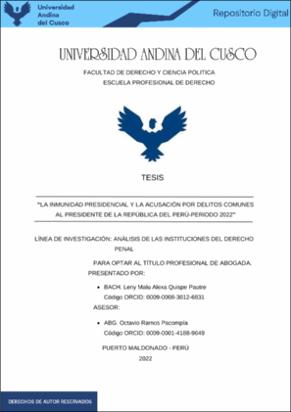| dc.contributor.advisor | Ramos Pacompia, Octavio | |
| dc.contributor.author | Quispe Pautre, Leny Malu Alexa | |
| dc.date.accessioned | 2023-10-25T21:08:30Z | |
| dc.date.available | 2023-10-25T21:08:30Z | |
| dc.date.issued | 2022-11-27 | |
| dc.identifier.uri | https://hdl.handle.net/20.500.12557/5768 | |
| dc.description.abstract | La inmunidad presidencial es aquella conferida al funcionario de alto nivel con la
finalidad de que este tenga un trato especial frente a la presunta o comisión de un
delito. Hoy en día, este derecho constitucional viene siendo cuestionado por la
población ya que evita que los mandatarios sean investigados durante el ejercicio de
su mandato.
Esta tesis es un enfoque de investigación cualitativa donde se analizará si el beneficio
de tener inmunidad presidencial es correcto o no, así como los fundamentos sobre si
se pueden cometer delitos comunes durante el mandato correspondiente.
Actualmente existe un debate sobre si se debe conservar, modificar o derogar este
privilegio que tienen los presidentes.
Para el desarrollo de dicha tesis, se utilizó como técnica la observación, por la que se
empleó fichas de observación para la recolección de información, de acuerdo a la
propia doctrina, las constituciones de diferentes países como Derecho Comparado y
sobre todo la más importante que es la del Perú.
Por otro lado, también contamos con aquellos casos en los que se pide la eliminación
de la Inmunidad Presidencial porque es considerado como un privilegio que tiene el
Presidente de la República protegiéndolo de ser investigado o procesado a menos
que haya infringido uno de los numerales del artículo 117° de la Constitución Política
del Perú; por lo que se necesita tener informes mucho más concretos de acuerdo a
dicho problema, con la finalidad de hacerla más clara y evitar que se interprete de
manera inadecuada. | es_PE |
| dc.description.abstract | Presidential immunity is that conferred on a high-level official so that he or she has
special treatment in the face of the alleged or commission of a crime. Today, this
constitutional right has been questioned by the population since it prevents leaders
from being investigated during the exercise of their mandate.
This thesis is a qualitative research approach where it will be analyzed whether the
benefit of having presidential immunity is correct or not, as well as the grounds on
whether common crimes can be committed during the corresponding mandate. There
is currently a debate over whether to preserve, modify, or repeal this privilege that
presidents have.
For the development of this thesis, observation was used as a technique, for which
observation sheets were used for the collection of information, according to the
doctrine itself, the constitutions of different countries such as Comparative Law and
especially the most important that is that of Peru.
On the other hand, we also have those cases in which the elimination of Presidential
Immunity is requested because it is considered as a privilege that the President of the
Republic has, protecting him from being investigated or prosecuted unless he has
violated one of the numerals of article 117° of the Political Constitution of Peru;
Therefore, it is necessary to have much more specific reports according to said
problem, in order to make it clearer and prevent it from being interpreted in an
inappropriate manner. | en_US |
| dc.format | application/pdf | es_PE |
| dc.language.iso | spa | es_PE |
| dc.publisher | Universidad Andina del Cusco | es_PE |
| dc.rights | info:eu-repo/semantics/openAccess | es_PE |
| dc.rights.uri | https://creativecommons.org/licenses/by-nc-nd/4.0/ | es_PE |
| dc.subject | Antejuicio político | es_PE |
| dc.subject | Presidencia de la república | es_PE |
| dc.subject | Inmunidad presidencial | es_PE |
| dc.title | La inmunidad presidencial y la acusación por delitos comunes al presidente de la república del Perú-periodo 2022 | es_PE |
| dc.type | info:eu-repo/semantics/bachelorThesis | es_PE |
| thesis.degree.name | Abogada | es_PE |
| thesis.degree.grantor | Universidad Andina del Cusco. Facultad de Derecho y Ciencia Política | es_PE |
| thesis.degree.discipline | Derecho | es_PE |
| dc.publisher.country | PE | es_PE |
| dc.subject.ocde | https://purl.org/pe-repo/ocde/ford#5.05.00 | es_PE |
| renati.advisor.dni | 01325750 | |
| renati.advisor.orcid | https://orcid.org/0009-0001-4188-9649 | es_PE |
| renati.author.dni | 73617554 | |
| renati.discipline | 421016 | es_PE |
| renati.juror | Vasquez Rodríguez, Miguel Ángel | |
| renati.juror | Ybarra Tomayconza, Jenny | |
| renati.juror | Ocola Nina, Halberth Javier Antonio | |
| renati.juror | Ochoa Saire, Fredy | |
| renati.level | https://purl.org/pe-repo/renati/level#tituloProfesional | es_PE |
| renati.type | https://purl.org/pe-repo/renati/type#tesis | es_PE |
| dc.description.lineadeinvestigacion | Análisis de las instituciones del derecho penal | es_PE |




